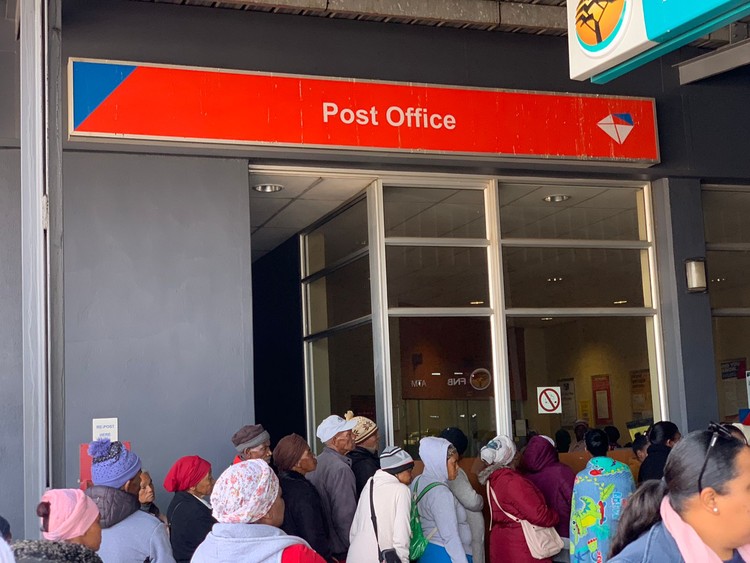
25 April 2024
Post offices across the country are in a state of disarray. We asked the major political parties what they intend to do about it. Archive photo: Ashraf Hendricks
Today’s question to the major political parties deals with the South African Post Office.
We asked the ANC, DA, EFF, IFP, FF Plus, ActionSA, PA, MK Party, and RISE Mzansi on 13 March and sent follow-up queries to those who did not respond. Some have still not responded.
Answers are very lightly edited for grammar and typos.
Does South Africa still need a Post Office? If yes, what steps would you take
to fix it?
ANC: The ANC did not respond to our questions.
DA: There is an opportunity for the South African Post Office (SAPO) to play an important role within communities, especially those in rural and mostly under-serviced regions of the country. These opportunities have however not been exploited in the past. As a point of departure, SAPO must first sort out its delivery of parcels and mail before proceeding to offer other services.
The DA recommendations to secure the future of SAPO are:
EFF: The EFF has always acknowledged the vital role that SAPO plays in providing essential postal and financial services to communities nationwide. Despite its significance, SAPO has faced severe challenges due to neglect and financial mismanagement, resulting in mounting debt and a decline in service quality. The EFF condemns the deliberate effort by the ANC to undermine public entities, potentially leading to privatisation post-collapse.
In response to these challenges, the EFF has outlined a comprehensive strategy to rejuvenate SAPO. Central to our approach is a commitment to alleviate SAPO’s financial burdens by eliminating all existing debts, providing the organisation with a clean slate to initiate its recovery journey. Moreover, the EFF emphasises the importance of modernising SAPO’s infrastructure, promoting digitisation to ensure that SAPO remains competitive in a rapidly evolving postal landscape.
Furthermore, the EFF seeks to empower the Postbank to fulfil its developmental mandate effectively. By expanding access to affordable financial services, particularly among marginalised communities, the EFF aims to contribute to economic empowerment and inclusivity. This vision aligns with the EFF’s broader manifesto, highlighting their dedication to strengthening state entities as pillars for national development.
Under an EFF-led government, SAPO would not only undergo revitalisation efforts but also serve as a central hub for government communications. By mandating that all departments and state-owned entities utilise SAPO for email hosting, the EFF aims to streamline operations, enhance efficiency, and maximise the utilisation of SAPO’s services across various sectors.
IFP: Yes and no. Yes, while the Post Office’s footprint across the country is still the closest form of a government agency in many rural and far flung areas, it is required as point of delivery for government services. No, as we would encourage a private-public partnership in rescuing the post office.
FF Plus: A postal service is still necessary for economic activity. SAPO is however bankrupt beyond the point of saving and should rather be privatised.
ActionSA: ActionSA recognises the need for the implementation of urgent reforms to improve the efficiency and functioning of the Post Office.
PA: Post offices have long been considered a public good worldwide, and South Africa used to have one of the best. Due to mismanagement and incompetence, the service has now largely been privatised and the free market is finding ways to solve the problem of mail, courier services and package solutions in a more nimble and efficient way than the government was able to. Unfortunately, this horse has bolted, and the ANC-led government should hang its head in shame.
MK Party: The MK Party did not respond to our questions.
RISE Mzansi: South Africa does not need a Post Office, to provide universally accessible postal, government, financial and other services to the public. It must be reimagined and modernised to operate sustainably today. The last few years have made it obvious that the government does not have the capital and skills to manage SAPO sustainably as the sole owner, as it once did with Telkom.
The state should invite private sector partners to bid on minority and majority ownership models. The ongoing public mandate should be clearly defined. The state should accept the most compelling offer based on vision and business plan, track record of bidders and financial offer. It should then allow its board and management – with fit for purpose directors and managers appointed on merit by the shareholders – to run the entity.